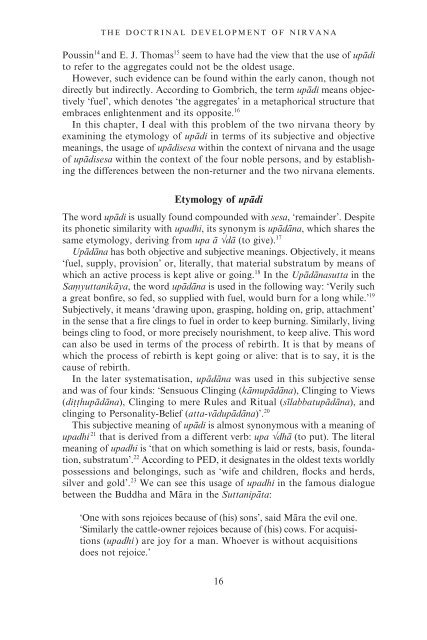Metaphor and Literalism in Buddhism: The ... - misterdanger.net
Metaphor and Literalism in Buddhism: The ... - misterdanger.net
Metaphor and Literalism in Buddhism: The ... - misterdanger.net
Create successful ePaper yourself
Turn your PDF publications into a flip-book with our unique Google optimized e-Paper software.
THE DOCTRINAL DEVELOPMENT OF NIRVANA<br />
Pouss<strong>in</strong> 14 <strong>and</strong> E. J. Thomas 15 seem to have had the view that the use of upAdi<br />
to refer to the aggregates could not be the oldest usage.<br />
However, such evidence can be found with<strong>in</strong> the early canon, though not<br />
directly but <strong>in</strong>directly. Accord<strong>in</strong>g to Gombrich, the term upAdi means objectively<br />
‘fuel’, which denotes ‘the aggregates’ <strong>in</strong> a metaphorical structure that<br />
embraces enlightenment <strong>and</strong> its opposite. 16<br />
In this chapter, I deal with this problem of the two nirvana theory by<br />
exam<strong>in</strong><strong>in</strong>g the etymology of upAdi <strong>in</strong> terms of its subjective <strong>and</strong> objective<br />
mean<strong>in</strong>gs, the usage of upAdisesa with<strong>in</strong> the context of nirvana <strong>and</strong> the usage<br />
of upAdisesa with<strong>in</strong> the context of the four noble persons, <strong>and</strong> by establish<strong>in</strong>g<br />
the differences between the non-returner <strong>and</strong> the two nirvana elements.<br />
Etymology of upAdi<br />
<strong>The</strong> word upAdi is usually found compounded with sesa, ‘rema<strong>in</strong>der’. Despite<br />
its pho<strong>net</strong>ic similarity with upadhi, its synonym is upAdAna, which shares the<br />
same etymology, deriv<strong>in</strong>g from upa A √dA (to give). 17<br />
UpAdAna has both objective <strong>and</strong> subjective mean<strong>in</strong>gs. Objectively, it means<br />
‘fuel, supply, provision’ or, literally, that material substratum by means of<br />
which an active process is kept alive or go<strong>in</strong>g. 18 In the UpAdAnasutta <strong>in</strong> the<br />
SaNyuttanikAya, the word upAdAna is used <strong>in</strong> the follow<strong>in</strong>g way: ‘Verily such<br />
a great bonfire, so fed, so supplied with fuel, would burn for a long while.’ 19<br />
Subjectively, it means ‘draw<strong>in</strong>g upon, grasp<strong>in</strong>g, hold<strong>in</strong>g on, grip, attachment’<br />
<strong>in</strong> the sense that a fire cl<strong>in</strong>gs to fuel <strong>in</strong> order to keep burn<strong>in</strong>g. Similarly, liv<strong>in</strong>g<br />
be<strong>in</strong>gs cl<strong>in</strong>g to food, or more precisely nourishment, to keep alive. This word<br />
can also be used <strong>in</strong> terms of the process of rebirth. It is that by means of<br />
which the process of rebirth is kept go<strong>in</strong>g or alive: that is to say, it is the<br />
cause of rebirth.<br />
In the later systematisation, upAdAna was used <strong>in</strong> this subjective sense<br />
<strong>and</strong> was of four k<strong>in</strong>ds: ‘Sensuous Cl<strong>in</strong>g<strong>in</strong>g (kAmupAdAna), Cl<strong>in</strong>g<strong>in</strong>g to Views<br />
(diMMhupAdAna), Cl<strong>in</strong>g<strong>in</strong>g to mere Rules <strong>and</strong> Ritual (sClabbatupAdAna), <strong>and</strong><br />
cl<strong>in</strong>g<strong>in</strong>g to Personality-Belief (atta-vAdupAdAna)’. 20<br />
This subjective mean<strong>in</strong>g of upAdi is almost synonymous with a mean<strong>in</strong>g of<br />
upadhi 21 that is derived from a different verb: upa √dhA (to put). <strong>The</strong> literal<br />
mean<strong>in</strong>g of upadhi is ‘that on which someth<strong>in</strong>g is laid or rests, basis, foundation,<br />
substratum’. 22 Accord<strong>in</strong>g to PED, it designates <strong>in</strong> the oldest texts worldly<br />
possessions <strong>and</strong> belong<strong>in</strong>gs, such as ‘wife <strong>and</strong> children, flocks <strong>and</strong> herds,<br />
silver <strong>and</strong> gold’. 23 We can see this usage of upadhi <strong>in</strong> the famous dialogue<br />
between the Buddha <strong>and</strong> Mara <strong>in</strong> the SuttanipAta:<br />
‘One with sons rejoices because of (his) sons’, said Mara the evil one.<br />
‘Similarly the cattle-owner rejoices because of (his) cows. For acquisitions<br />
(upadhi) are joy for a man. Whoever is without acquisitions<br />
does not rejoice.’<br />
16











